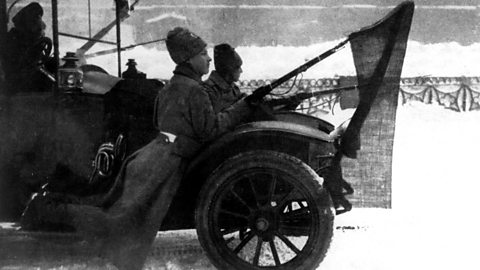Revolution from below
By February 1917 the civilian population was unhappy for a number of reasons:
- It was winter and there were shortages of both food and fuel due to the collapse of the transport system
- Huge casualties in the war had led to many Russians becoming dissatisfied and demoralised
- The Royal Families behaviour caused many to question their competence to lead and also their loyalty. Gossip and rumours about Rasputin had damaged the reputation of the Tsarina. Some even believed that she was deliberately trying to damage the war effort because she was a “German Princess”
In February a series of events led to the downfall of the Tsar
On February 22nd workers at the Putilov works in Petrograd went on strike after the failure of pay talks. The following day a series of demonstrations in connection with International Women’s Day took to the streets. Many carried banners protesting about the lack of bread. They were joined by many other workers. By the 25th, the numbers of strikers and protestors had risen to 250, 000 people. The army was ordered to restore order and fire on the demonstrators.
Although one regiment (the Volynskii) did so, others began to question the order. By February 27th large numbers of soldiers were refusing to obey orders. Many were siding with the demonstrators. The Tsarist authorities had lost control.

The fall of the Tsar
When informed of these events, Nicholas II dismissed it as a "hooligan movement" which would soon be over. Even as his regime met total collapse, the Tsar still showed his inability to face reality and act appropriately.
Nicholas made an attempt to return from the war front to the capital, Petrograd, and reclaim his authority. But in late February revolutionaries diverted the train to Pskov. Isolated and powerless without the support of the army, his reign as Tsar was over - the only option now was abdication.
Nicholas named his brother, the Grand Duke Michael, as his successor. Michael lacked the support of the people or the military. He refused the position. With that, the Romanov dynasty surrendered its 300 year control of Russia.